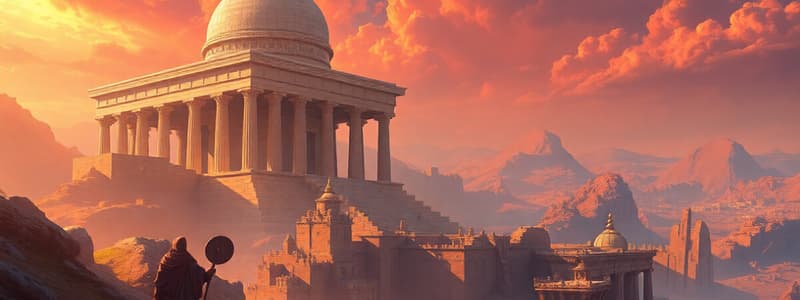Podcast
Questions and Answers
Who were the prominent leaders of the Achaemenid Empire?
Who were the prominent leaders of the Achaemenid Empire?
- Pericles, Phillip II, Alexander the Great
- Constantine, Augustus, Nero
- Marcus Aurelius, Genghis Khan, Charlemagne
- Cyrus the Great, Darius the Great, Xerxes (correct)
What historical event caused the downfall of Athens?
What historical event caused the downfall of Athens?
- The death of Pericles
- The invasion of the Romans
- The formation of the Delian League
- The death of Alexander the Great (correct)
What was the primary characteristic of the Persian Empires under Cyrus and his successors?
What was the primary characteristic of the Persian Empires under Cyrus and his successors?
- Tolerant of the cultures they conquered (correct)
- Strict enforcement of Persian culture
- Complete isolation from other civilizations
- A focus solely on trade and commerce
What was significant about the Silk Road in ancient history?
What was significant about the Silk Road in ancient history?
Which of the following statements about Judaism is correct?
Which of the following statements about Judaism is correct?
What is the holy text of Christianity?
What is the holy text of Christianity?
Which city is known as the capital of the Achaemenid Empire?
Which city is known as the capital of the Achaemenid Empire?
What major cultural impact occurred due to the Silk Road?
What major cultural impact occurred due to the Silk Road?
Flashcards are hidden until you start studying
Study Notes
Persian Empires
- The Achaemenid Empire was the first Persian Empire, lasting from the 6th to the 4th century BCE.
- Key rulers included Cyrus the Great, Darius the Great, and Xerxes.
- The empire spanned from Anatolia (modern Turkey) to the Indus River Valley.
- The Persian Empire was known for its strong military and emphasis on conquering land.
- They were tolerant of the cultures they conquered, allowing them to maintain their own traditions while paying tribute.
- Persepolis was the capital of the Persian Empire, but was later destroyed by Alexander the Great.
- The Persian Empire eventually fell to the Greeks after a series of conflicts.
Ancient Greece
- The Classical period of Ancient Greece lasted from 510 to 323 BCE.
- Important figures include Pericles, Philip II of Macedon, and Alexander the Great.
- The Delian League, a democratic alliance of Greek city-states, was a significant political structure during this time.
- Athens, the capital of Attica, was a major center for art, mathematics, politics, philosophy, literature, and culture.
- Athens was named after Athena, the goddess of wisdom and war, who won a contest against Poseidon for the patronage of the city.
- Greece experienced numerous wars during this time, including the Peloponnesian Wars (fought twice) and the Corinthian War.
- Many conflicts involved Greek city-states like Sparta and Macedon.
Silk Road
- The Silk Road, a network of trade routes connecting Asia, Africa, and Europe, facilitated the spread of goods and ideas.
- This process of cultural exchange is known as cultural diffusion.
- The Silk Road was active for over 1300 years, starting with the Han Dynasty in China and expanding westward.
- The Ottoman Empire eventually closed off trade routes to the East, effectively ending the Silk Road.
- The Silk Road also facilitated the spread of diseases, such as the bubonic plague, also known as the Black Death.
Judaism
- Judaism is one of the "Big Three" religions with a history dating back about 4,000 years.
- It is considered both a religion and an ethnicity.
- Judaism is a monotheistic religion, worshipping one God.
- The Torah is the holy text of Judaism.
- Oral traditions passed down through generations are also an important aspect of Judaism.
- The religion has faced persecution throughout history, leading to various reforms and movements.
- Historically, Jewish communities have been conquered by numerous empires, including the Assyrians, Babylonians, Persians, Greeks, Romans, and Ottomans.
Christianity
- Christianity is another one of the "Big Three" religions, with the symbol of the cross.
- It experienced rapid growth from the 3rd to the 8th century.
- Christianity originated within Judaism.
- It is also a monotheistic religion, believing in one God, known as the Holy Trinity: Father, Son, and Holy Spirit.
- The Bible is the holy text of Christianity.
- The division of the Roman Empire into East and West led to the development of Roman Catholicism and Eastern Orthodoxy.
- Christianity has undergone many rifts and reformations throughout history.
Studying That Suits You
Use AI to generate personalized quizzes and flashcards to suit your learning preferences.




